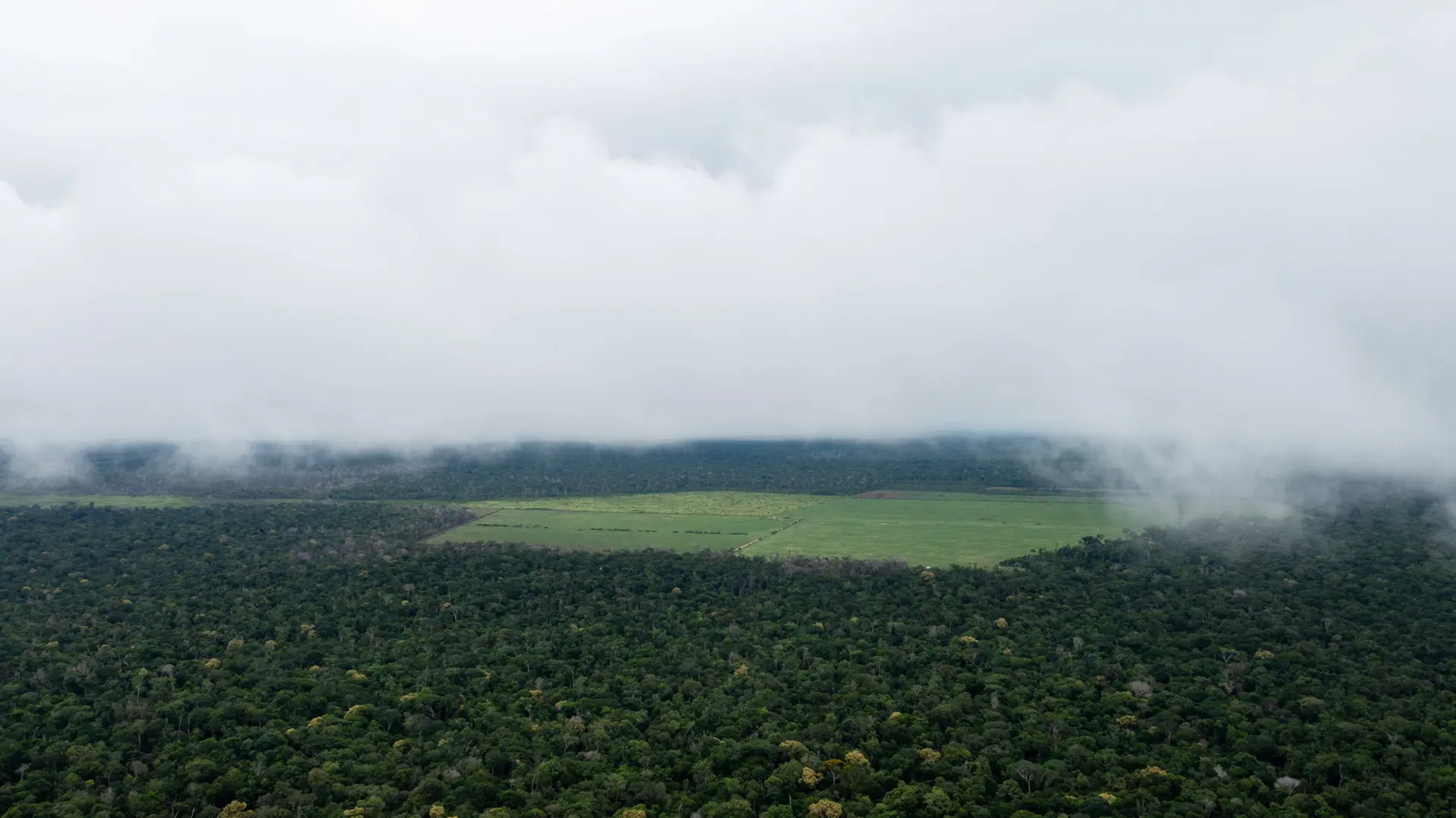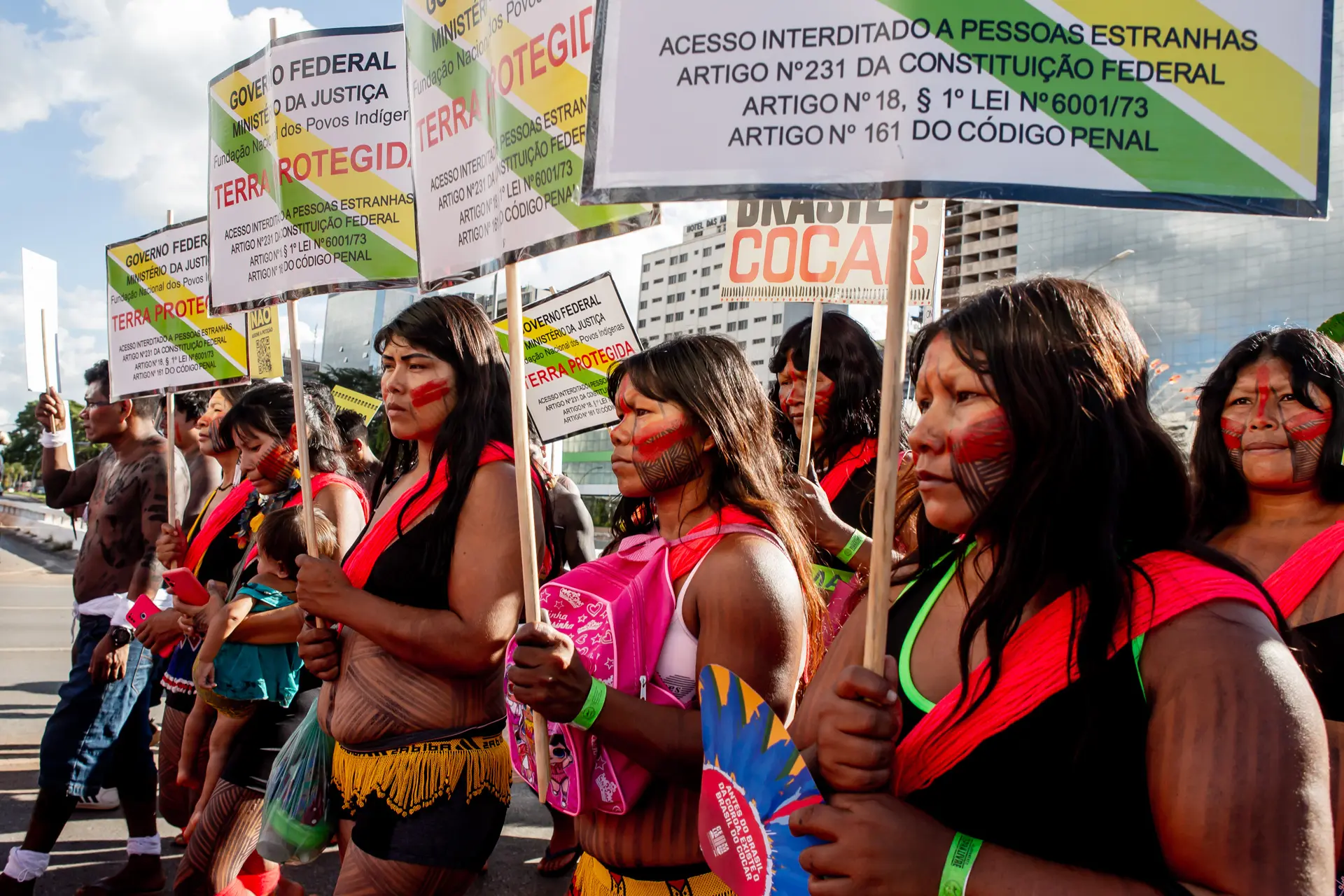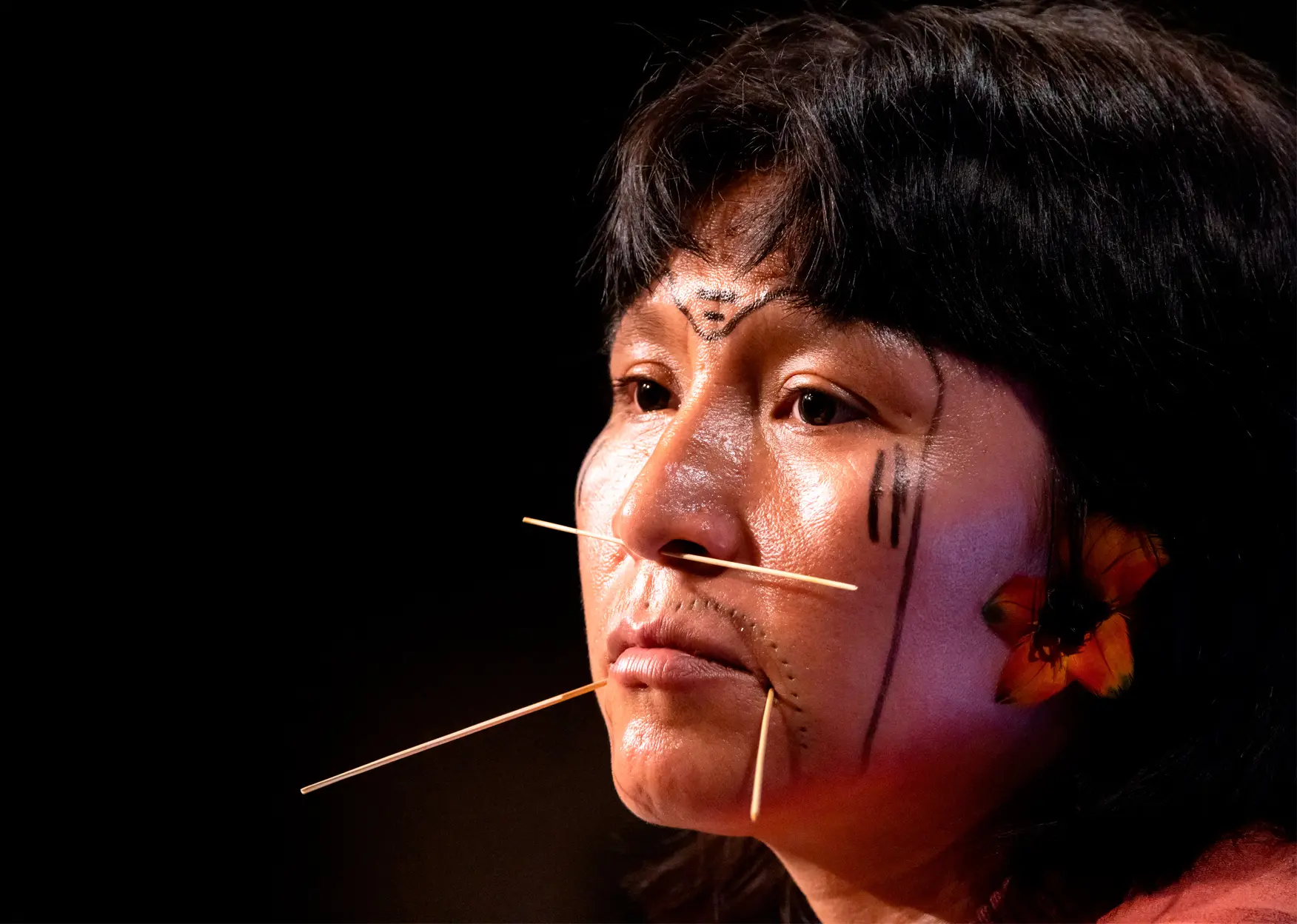At the two-week conferences on climate change held annually by the UN, country negotiators often work late into the night haggling over every last comma. Since the beginning of this year, Ana Toni has been engaged in a marathon of talks in preparation for COP30, scheduled for this coming November in Belém. Toni, who is climate change secretary at Brazil’s ministry of the environment, was appointed executive director of the conference in January and shares the command with COP president André Corrêa do Lago, a veteran climate negotiator. The two of them also divided leadership of Brazil’s negotiation team at the last two COPs, both during Lula’s current term of office.
In recent weeks, Toni has met with representatives of Indigenous peoples, traditional communities, business people, and socio-environmental organizations. The interview she gave to SUMAÚMA in Brasilia on March 10 was partly done in a cab, because she didn’t want to be late for her talk at the National Confederation of Industry. In addition to fulfilling her COP30 role, Toni is still coordinating the drafting of Brazil’s Climate Plan, which will define how seven sectors—including energy, agriculture, and forestry—can help the country reach its target for the reduction of greenhouse gas emissions. The plan should be ready before COP30.

Ana Toni in talks with Indigenous and quilombola communities, part of a marathon of negotiations that began in January. Photos: Ministry of Environment/COP-30 Presidency
Toni, who holds degrees in both economy and political science, has spent her career working for various nongovernmental organizations, including Greenpeace, the Ford Foundation, and Brazil’s Institute for Climate and Society. As secretary to environment minister Marina Silva, she has adopted cautious language and avoided stepping on any toes during her negotiations with representatives of divergent interests, both inside and outside the government. In the case of COP30, she has dedicated herself to defining the action agenda, which is a list of commitments announced by coalitions of countries and organizations, aimed at implementing the Paris climate accord, which turns ten this year.
According to Toni, it is her job to ensure the agenda aligns with the global stocktake approved two years ago at COP28. The document measures countries’ progress in their pledges to hold the planet to a 1.5oC average temperature increase over pre-industrial era levels, commitments that include phasing out fossil fuels and ending deforestation.
Last year, when the world’s average temperature climbed more than 1.5oC for the first time, droughts and flooding had catastrophic effects on the lives of millions of people. Based on the greenhouse gas reduction targets submitted by countries through last year, UN scientists have calculated that temperatures will rise 2.6oC to 3.1oC before the end of this century. It’s not hard to imagine what this means for life on the planet, and this projection didn’t even take into account Donald Trump’s decision to pull the United States—the world’s second largest emitter, after China—out of the Paris Agreement.
This year, almost all 200 parties to the agreement must inform the Climate Convention of their new emission reduction goals through 2035, known as Nationally Determined Contributions. So far only 19 nations have done so, Brazil among them. The fact that so many missed the official deadline of February 10 can be attributed to international tensions, as military spending has intensified and governments and corporations have backtracked on their climate pledges.
One of the tasks of the COP30 leadership, says Toni, is to see how different international organizations can encourage countries to propose more ambitious goals. To make this happen, she argues, it is necessary to go beyond the limited powers of the Climate Convention and move negotiations into other forums, especially those that influence the global flow of money.
Below are the main excerpts from the interview.
SUMAÚMA: In the run-up to COP30, one thing you’re involved with are initiatives to implement the climate agreement’s so-called action agendas. You’ve mentioned the Marrakech Partnership, which encompasses nearly 500 initiatives—but hardly anybody knows about it. What is working, and what isn’t?
ANA TONI: The Marrakech Partnership was inaugurated in 2016, following the Paris Agreement on climate change. It has been very successful in engaging society, the private sector, and sub-national governments in the climate agenda. The partnership recognized that to enforce [the Paris Agreement], other actors, not just negotiators, had to be involved. When the terms of the partnership were negotiated, nine sectors were agreed on, including energy, agriculture, and cities. And then this whole thing of commitments, pledges, and action agendas began. To define what we’re going to do with our action agenda, we’re seeing what pledges and commitments have been made, what’s happened with them, and how they relate to negotiations. What we’ve realized is that sometimes the link between the action agenda and what was negotiated isn’t so clear. And we think one of the possible contributions to be made by Brazil, in its role as COP president, might be to make this link a bit clearer—in other words, how the action agenda can help with enforcement. The mandate of the Marrakech Partnership was renewed last year, and our mandate for this COP is to think about the action plan for the next five years. One of the ideas we’ve been working on is, now that we have the global stocktake [with measures that should be taken to meet goals], which was approved at COP28, perhaps the role of the action agenda should be to implement what was agreed on there—for example, tripling renewable energy, transitioning away from fossil fuels, and halting deforestation. Instead of leaving it so open as to what each presidency wants to do in terms of an action plan, let the action agendas serve to implement what was defined in the global stocktake, because then you set a pace, a positive wave. Every five years, there is a new stocktake, and when we have a new one, we’ll see what needs to speed up.
Because COP30 will take place in the Amazon, I understand there will be a lot of emphasis on the forest agenda, in terms of conservation, restoration, and combatting deforestation.
Forests are included in the global stocktake, which has 196 numbered paragraphs, 40 of them actionable. Our presidency isn’t going to be able to handle all 40, but we’ll choose some that make the most sense in Brazil. The next presidency can choose what’s most appropriate for their own case while following the same logic, that is, implementing what has already been agreed to.

Brazil took 20 years to consolidate its forest policies, and the debate on ending oil consumption has to move faster, says Ana Toni. Photo: João Laet/SUMAÚMA
Brazil has proposed the creation of an international fund called Tropical Forests Forever, which would pay for conservation efforts, and there is the United for Our Forests coalition, which was born at the Amazon Summit, held in Belém in 2023. Are all of the countries in the coalition part of the fund? What’s the relation between these two?
United for Our Forests is a broad political process where countries with tropical rainforests address the issue. The Tropical Forests Forever Fund is one of the instruments under this umbrella, with perhaps a sub-group interested in taking part. It’s not mandatory for everyone to be part of everything.
In addition to the fund, it seems many are thinking forest restoration can be financed by the carbon market, which will be overseen by the Climate Convention, according to rules defined at last year’s COP. What are your thoughts?
The global carbon market is just getting started. There was a whole debate about whether forest carbon credits should be considered part of this market. At COP29, it was decided that forest carbon credits could enter in. What we need to figure out is which kinds of forest carbon credits will qualify. Some suggestions have been made, but it’s clear nobody is against using carbon credits for restoration. People are leery, because let’s say I reforest all of this here and then it’s burned off. So, for example, I sell carbon credits for a given area, but do I have to have another area [to guarantee carbon will continue to be absorbed if something happens to the first]? Discussions are focusing on details now, on what exactly would enter and how. This is happening at an international level, within the convention’s group of carbon market experts, and here on our national carbon market [which has been approved by Congress but not yet implemented]. I’m very glad forest carbon credits will be included, and now it’s a matter of knowing which credits would be good, which would add [help absorb CO2 from the atmosphere in addition to what existing vegetation already does], and which would be certain.
Is the emphasis you’re placing on the action agenda, which doesn’t produce documents backed by the weight of international law, an admission that there is little that can be achieved in terms of negotiation among all of the countries? Or do you also have ambitions on the negotiation side?
No, it’s not. We have a lot of ambition when it comes to the negotiation aspect, but that’s what the Paris Agreement Rulebook decided at COP29 [the Rulebook covers aspects of the agreement that were awaiting definition]. That’s over, finished. The last items were financing [of the ecological transition of countries with fewer resources] and the carbon market. So the big topics for negotiation aren’t on the table at this COP or the next one. What’s up for negotiation are the details of what has already been agreed to. It’s like when a law is approved in Brazil and then its details are defined during the promulgation process. Now we’re working on that second phase, and the devil is in the details. So the negotiations are going to have a different rhythm, because now it will be the rhythm of promulgation. Many things have been agreed on, like ending deforestation and phasing out fossil fuels. But you can’t just reach agreements without following through. The implementation of the agreements will remain on the agenda. But when it comes to the bigger themes, what more is there to debate that isn’t already there?
When it comes to fossil fuels, for example. At last year’s COP, Brazilian representatives proposed establishing a timetable, given that the global stocktake said the phase-out should take place in a “fair, orderly, and equitable” manner. As long as no timetable exists, countries will continue fighting, Brazil included, about who will produce the last drop of oil. Why did you decide not to include the idea of a timetable in the letter released today [March 10], since this would be a huge negotiation victory for COP30?
Because it’s not mandated [not on the official climate conference agenda] that we leave COP30 with a timetable. No agreement on this was reached at either COP29 or COP28. Brazil submitted a proposal, but it wasn’t accepted by other parties.
But now, leading COP, can’t you include a timetable?
We can’t force it. As the presidency of COP, we can’t say, “I want there to be a timetable.” On the contrary, the COP presidency has the role of uniting everyone so we can make progress. It’s not, “My concerns are this and that.” Brazil already submitted this proposal; it will return to the table. But the proposal has to be accepted by the other negotiators. It could come from the COP presidency if it were on the action agenda. Since it’s a negotiation agenda, we have to ensure the negotiators want to sit down to debate a timetable. The decision to phase out fossil fuels has been made.
But what we’re seeing is that it’s not going to happen if it’s left up to individual countries or businesses.
But the decision has been made. For all of those concerns, [the end of] deforestation, etc. What’s very clear in the letter is that Brazil is prioritizing the implementation of the global stocktake. So what are the next steps? We want to aim the negotiations and the action agenda and the mobilization agenda at the enforcement of what’s in there. What we don’t want is to go backwards. What we want to know is what the next step will be toward implementation, for example, of the phaseout of fossil fuels or deforestation. What’s the next step? That’s what we’ll aim for in negotiations. Whether it will be a timetable or a negotiating group, what format it will have, and what the outcome will be–we’re obviously consulting all parties. But our priority is the implementation of what’s already been agreed on.
Some countries think implementation is achieved through NDCs and NDCs alone. Brazil has already taken care of ours, and each country will have to say how it is implementing its NDCs or how it will contribute to phasing out fossil fuels and to halting deforestation, as required [in the document countries have to submit to the Climate Convention, along with their NDCs]. Then, in the synthesis report [which the Climate Convention releases before the conference, evaluating submitted NDCs], we will see what countries are doing individually. Maybe the bulk of the implementation will come through at a country level. But we will also see what, at the international level, can and should be agreed on to support or facilitate this implementation. Some countries interpret implementation as 100% national. And others say that while the national part is fundamental, we can agree on some things at the international level, be it ending general subsidies for something or other, or a global tax on something or other, or thinking of a timeline that will help with countries’ implementation. That’s where the debate is at.
That would also apply to financing, right? At last year’s COP, the UN secretary general, António Guterres, argued we have to make polluters pay. He mentioned taxing aviation and fossil fuels, sectors that are most responsible for the climate emergency. Is the idea of those taxes still on the table?
It could be. Right now, unfortunately, there is nothing in the documents from the Climate Convention that talks about global taxation. Why not? Because it is not in the scope of the convention to create those taxes. There was that decision to have a global tax on multinationals [within the Organisation for Economic Co-operation and Development, or OECD, known as the “rich countries club,” which proposed a tax of at least 15% on the profits of large multinationals]. If we come to the conclusion at the Climate Convention that, for example, global taxes could help reach our goals, that would empower other institutions to get things done. However, central banks aren’t the ones negotiating at the Climate Convention. That’s been a bit of a challenge, and why we’re saying we now have to move beyond the bounds of the Climate Convention. Because, especially when it comes to economics, the Climate Convention doesn’t have the power to make many of the fundamental decisions. That can happen in meetings of ministers of finance; that can happen at the OECD. The Climate Convention can suggest it, request it, and then [the suggestion or request] becomes a topic of negotiation.

Ana Toni argues that any move to tax major polluters, like the aviation industry, needs the backing of international financial bodies. Photo: Bruno Santos/Folhapress
But is the Brazilian leadership in favor of putting the topic on the agenda for debate?
Brazil led the Task Force for the Global Mobilization against Climate Change, within the G20 [a group of the world’s largest economies, presided over by Brazil in 2024]. What the Task Force agreed on covered all of these topics, and we want to take a lot of inspiration from what we learned there. Whereas here we have negotiations among 196 countries, and we don’t know if all parties will agree with this. In the Task Force’s declaration on climate, there are many of these debates on subsidies, taxation, private sector investments, and the difficulty for emerging countries when it comes to classification of credit risk. For example, who defines the rules for what is a risk and what’s not? Unfortunately, not the Climate Convention. That’s why the Task Force made it a point to have ministers of finance, central bank presidents, and ministers of climate and of foreign relations at the table. Normally, it’s climate ministers who attend COPs, and they don’t have the mandate to debate this issue. That’s why we’re asking the finance ministry to continue working with us. We’d like to engage the decision makers of these large forums beyond the bounds of the Climate Convention. But we can’t force them.
You’re still responsible for the Climate Plan, right?
Yes, I’m in the ministry [of the environment], so I’m doing both jobs, but we’re debating amongst ourselves if I should, or if I should take a temporary leave of absence.
We know agriculture is not an official topic of negotiation at COPs, but it’s the most important sector in the Climate Plan.
There’s an article in the global stocktake that discusses agriculture and food security [“encouraging” sustainable agriculture]. It’s obviously going to be fundamental for us [in the Climate Plan].
At COP29, people from the agriculture ministry itself said Brazil doesn’t need to deforest any more land for agricultural production to keep on growing, but it’s a sector that still is very resistant to the environmental agenda.
I don’t think we can make generalizations about the agricultural sector or agribusiness. I think there is a small group that continues to resist, and it’s one of the reasons they’re suffering so much with climate change. There’s a whole debate about the agricultural losses they’re having; they’re experiencing this firsthand. They’ve also seen the opportunities and demand from abroad. So I think it’s a process. If we remember the debate about ending deforestation we had when minister Marina Silva started talking about it years ago and see where we are now, we’ve come a long way. I hope to see the same trajectory for other topics like [fossil] fuels, which is a more recent debate in Brazil. It took us 20 years to get where we are in terms of the debate on deforestation; I hope the one about fuel will be much faster. The maturation of Brazilian society on these issues plays a big part in the sector’s stance.
This conference will be the first in a democratic country in four years. There will be many demonstrations, and if Brazil permits drilling in the Foz do Amazonas basin, the backlash will be huge. Accelerating the demarcation of Indigenous territories will be another issue. What kind of influence do you think the demonstrations will have on negotiations?
Demonstrations are always very welcome because they show our democracy is alive, dynamic, and strong. Participation by civil society is fundamental to the process at COP30, and thankfully Brazil is a democratic country. The solution to climate change involves the leadership of Black women, Indigenous people, young people, and representatives of traditional communities, among other groups. Feeling pressure from society, having a feel for what society is thinking, is very welcome for any issue. And the demonstrations don’t only have to be against; they can also be in favor. I also hope people come to COP and take a look at the good things about Brazil, [such as] its capacity to debate many of these topics and its Indigenous and Quilombola territories [inhabited by descendants of enslaved African rebels]. We have a critical national agenda in Brazil, but in the end it’s an international conference.

Civil society has a fundamental role to play at COP-30, says Ana Toni. Photo: Lela Beltrão/SUMAÚMA
Report and text: Claudia Antunes
Editing: Talita Bedinelli
Photo Editor: Lela Beltrão
Fact-checker: Plínio Lopes
Proofreader (Portuguese): Valquíria Della Pozza
Spanish translation: Julieta Sueldo Boedo
English translation: Diane Whitty and Maria Jacqueline Evans
Infographics: Rodolfo Almeida
Copyediting and finishing: Natália Chagas
Editorial workflow: Viviane Zandonadi
Editor-in-chief: Talita Bedinelli
Editorial director: Eliane Brum






